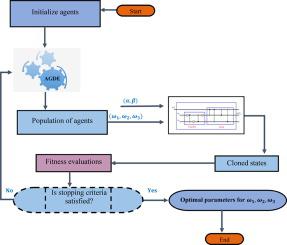Journal of Advanced Research ( IF 11.4 ) Pub Date : 2020-10-17 , DOI: 10.1016/j.jare.2020.10.001 Essam H. Houssein , Mohamed A. Mahdy , Manal. G. Eldin , Doaa Shebl , Waleed M. Mohamed , Mahmoud Abdel-Aty

|
Introduction
Quantum cloning operation, started with no-go theorem which proved that there is no capability to perform a cloning operation on an unknown quantum state, however, a number of trials proved that we can make approximate quantum state cloning that is still with some errors.
Objectives
To the best of our knowledge, this paper is the first of its kind to attempt using meta-heuristic algorithm such as Adaptive Guided Differential Evolution (AGDE), to tackle the problem of quantum cloning circuit parameters to enhance the cloning fidelity.
Methods
To investigate the effectiveness of the AGDE, the extensive experiments have demonstrated that the AGDE can achieve outstanding performance compared to other well-known meta-heuristics including; Enhanced LSHADE-SPACMA Algorithm (ELSHADE-SPACMA), Enhanced Differential Evolution algorithm with novel control parameter adaptation (PaDE), Improved Multi-operator Differential Evolution Algorithm (IMODE), Parameters with adaptive learning mechanism (PALM), QUasi-Affine TRansformation Evolutionary algorithm (QUATRE), Particle Swarm Optimization (PSO), Gravitational Search Algorithm (GSA), Cuckoo Search (CS), Bat-inspired Algorithm (BA), Grey Wolf Optimizer (GWO), and Whale Optimization Algorithm (WOA).
Results
In the present study, AGDE is applied to improve the fidelity of quantum cloning problem and the obtained parameter values minimize the cloning difference error value down to .
Conclusion
Accordingly, the qualitative and quantitative measurements including average, standard deviation, convergence curves of the competitive algorithms over 30 independent runs, proved the superiority of AGDE to enhance the cloning fidelity.
中文翻译:

基于自适应导引微分进化算法的量子克隆电路参数优化
介绍
量子克隆操作从无定理开始,证明没有能力对未知量子态执行克隆操作,但是,大量试验证明我们可以进行近似量子态克隆,但仍然存在一些错误。
目标
据我们所知,本文是尝试使用元启发式算法(例如自适应制导差分进化(AGDE))解决此类问题的第一篇论文,旨在解决量子克隆电路参数问题,以提高克隆保真度。
方法
为了研究AGDE的有效性,广泛的实验表明,与其他知名的元启发式算法相比,AGDE可以实现出色的性能。增强型LSHADE-SPACMA算法(ELSHADE-SPACMA),具有新型控制参数自适应(PaDE)的增强型差分进化算法,改进的多算子差分进化算法(IMODE),带自适应学习机制的参数(PALM),拟仿射变换进化算法(QUATRE),粒子群优化(PSO),引力搜索算法(GSA),布谷鸟搜索(CS),蝙蝠启发算法(BA),灰狼优化器(GWO)和鲸鱼优化算法(WOA)。
结果
在本研究中,AGDE用于提高量子克隆问题的保真度,并且所获得的参数值将克隆差异误差值降至最低。 。
结论
因此,竞争算法在30个独立运行中的定性和定量测量(包括平均值,标准差,收敛曲线)证明了AGDE增强克隆保真度的优越性。











































 京公网安备 11010802027423号
京公网安备 11010802027423号